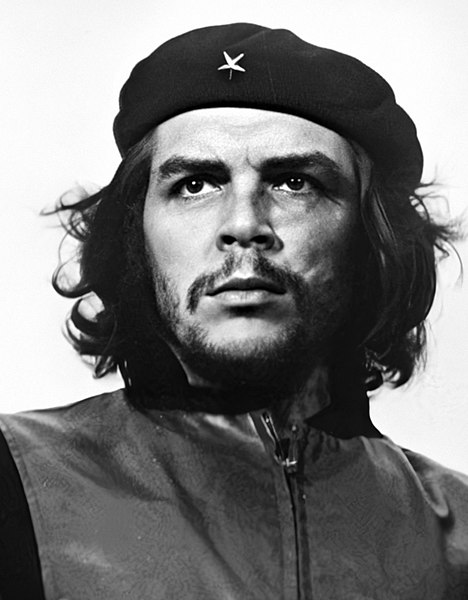Change has Become Commodified and Trivialized
Opinion

Alberto Korda via Wikimedia Commons
Che Guevara: revolutionary, communist, decoration
June 3, 2022
The last 2 years have been marked with instability. The housing crisis has enveloped multiple areas, inequality has ravaged the health care system, and wages have stagnated. There has been no shortage of problems that need solutions. And as a result, the topic of revolution has invariably come up. While very few genuinely mean the true sort of revolution that the “French” and the Russians enacted, there nevertheless continues to be an air of mysticism around the subject. The mere mention of the word revolution doesn’t fail to conjure up grandiose images of people taking to bloodied streets. Of heroism and valiance akin to Soviet paintings of the Bolsheviks taking power or beheaded kings and queens. In response to this inequality, we are instead seeing the rise of movements that people think are revolutionary, such as the anti-work movement or the fight to raise the minimum wage to $15. But the truth of the matter is that movements don’t become revolutions. Putting aside for a moment how performative a lot of supposedly revolutionary actions in the modern-day are, the true issue is that revolution has been commodified and trivialized to the point of near nullification.
First, the commodification. Whenever an idea threatens the fragile balance of our current systems, commodification seems to always be waiting in the wings to take any power which the idea would otherwise hold. There’s a word for this coined by Frank Marcuse: Repressive desublimation. Skipping over all the wordy bits, what this term refers to is an intentional flattening of ideas that threaten the status quo. Marcuse argues that these “threatening” ideas are full of energy stemming from dissatisfaction or frustrated desires. This energy is negative and serves as the catalyst for revolutions. But unlike in the past when potentially “destabilizing” ideas were repressed violently and completely, now the opposite happens. Gone are the witchhunts for “communists” of the 50s that were fronts for targeting civil rights activists. Instead, these expressions are allowed.
Or so it would seem.
These threatening ideas are commodified and what is disseminated instead is a comforting imitation. The commodified form removes all of the nuances that the original idea contained. Any criticism or depth that it had is flattened into a one-dimensional copy. The flattened copies remove all of that negative energy that is aimed at improving an institution or society.
The quintessential example of this is Che Guevara. If you know what that name means, I can with almost 100% certainty guess exactly what picture you think of when you hear that name. How could I not? It’s on t-shirts, mugs, and stickers; at this point, it would be easier to name all the things it hasn’t been on. He now looks more at home on some upper-middle-class college students’ laptops than he does in Cuba. And this is exactly the problem. What’s actually known about him? His actions? Ideas? When his existence and ideology are monetized, gone is the nuance of his reality, only to be replaced with some ersatz white-washed pop culture icon. Gone are his revolutionary ideals, as well as the far more grim reality of war. Now, all that remains is a simple “oh yeah, he’s the revolutionary right?” Commodification results in an actual human becoming nothing more than shorthand for “establishment = bad.”
Not only does commodification water down real people and ideas to ineffectual symbols, but it also abstracts them into something that cannot be. Che Guevara is now viewed in the mainstream through one of two lenses. The first is the past. A former revolutionary of a long-gone revolution. The 2nd is that of an unreal future: a utopia where no one suffers or nothing bad ever happens and all the structures that lead to suffering were destroyed. Che Guevara is only the most recognizable. It‘s happened to almost all ideas or symbols of anything that threatens the status quo. The USSR’s flag, the Black Power movement’s fist, Martin Luther King Jr and Malcolm X.
But commodification is only half the matter. The other more elusive half is trivialization. It plays out like this: people say there’s a problem, and instead of doing anything about it, the government just makes some superficial changes that don’t actually make the problem go away. This trivialization is very intentional, and it is meant to placate the frustrated people in the place of any real change. The majority of the time, we are bread crumbs of change in an effort to avoid any sort of real systemic change to better our lives.
Take, for example, the promise to cancel student loans. There have long been talks of student loan forgiveness or maybe even making college free. The Department of Education was commissioned to do a study on how this could be done, yet when the time to publish came, the study was redacted. With a nice shade of pink too. Because they can’t have it remind people of all those other redacted documents with their black ink and human rights violations. Instead of any real change to help those who really need it, the best we get is a new shade for redaction (because this administration isn’t like all those other administrations, they’re different and quirky, and they like pink) along with the pushing back of the date for repayment.
Speaking of human rights violations, another front that has received this new aesthetic revitalization is the military. In early 2021, the last possible organization you would’ve ever expected got a new look: the CIA. New logo, new website, new fonts, it completely shed the look of its previous self. All in a bid to hire a more diverse set of people. Instead of looking like the sort of organization that funds right-wing death squads, now it looks more like a Silicon Valley tech startup that makes Bluetooth-enabled, wifi-compatible toilet seats. Its logo would fit in better next to a Joy Division cover band. Are they still going to destabilize foreign governments? Yes, but they’ll have a strong independent girl boss do it.
This aesthetic revitalization is the hallmark of trivialization. Another example is the military’s new recruit ads that center on diversity in an attempt to try and distance itself from its long history of racism, homophobia, and sexism.
But why is it like this? The answer is neoliberalism. Neoliberalism is the idea that the government’s influence should be curbed, and that public institutions should be privatized. For example, if there’s a problem with student loans, instead of the government stepping in to do something about it, it will just put the burden onto some for-profit corporation. Neoliberalism shifts the focus of policy from people to profit.
Ever since Reagan became president, all presidents have been neoliberals. And the way that neoliberalism works, its appeal, is by presenting itself as the only option. That there are no alternatives. Most people don’t want some completely capitalist system where you have to pay for everything, but they also don’t want the opposite. For most people, neoliberalism seems to hit the sweet spot between too little government involvement and too much. It would appear to be right in between paying to breathe and the scourge of American ideals, communism.
Another factor for its success has been the shifting of the Overton window (This is the last big word, I promise). The Overton window is the range of policies politically acceptable to the mainstream population at a given time. It is also known as the window of discourse. Nowadays the Overton window is far more narrow than it has ever been. American politics have shifted to the right, meaning more conservative ideas are typically acceptable. Any policies that could cause real change are seen as too radical. If something like the New Deal were to be proposed today, it would barely even make it out of the President’s mouth before being shot down.
Even though such progressive policies are perfectly normal when compared to those of other countries. Just take a look at the UK conservative party manifesto. 2 of the Tories’ biggest goals are expanded funding for the nationalized healthcare system and more funding for green energy. Something like this would be almost unthinkable in America. As much as people think of Democrats and Republicans as complete opposites, they are far more similar than different. They will both do nothing to improve our lives. Neoliberalism incentivizes superficial changes to be made instead of any real changes to anything.
Most of this comes from a desire for good publicity. The promise of change is often the best way to get reelected. The most significant changes are not seen but are felt, and there is no glamour or publicity in hours of paperwork. That’s what’s most important. The changes that are broadcast and publicized, are meant to attract publicity and keep the status quo. In order for a fundamental change to occur, we must first care about one another.
When I was a kid I always remember walking with my mom and being stopped by random passersby. Random to me, because to my mom they were lifelong friends. They would always talk and I would stay in the back. I never understood why she made or kept so many friendships. But invariably they looked at me. And they would always talk about how they used to change my diapers or how they used to babysit me when I was a kid and my mom had to go to work. As I’ve grown older I’ve come to realize the sense of community that comes with it. When one person was going through something, the rest did their best to help. That’s what revolution truly is. That’s where change comes from, not just a concern for yourself but for others as well.
Community breeds empathy. This sense of community is what allows people to truly feel for one another. It is why community action groups or unions are so successful. When someone is suffering, you truly feel it and have a reason to join in with others to stop it. But neoliberalism is antithetical to community. The free market is about competition, so everyone must compete. People are pit against each other. Anything that is ineffective will be stamped out. That includes “inefficiencies” such as helping others. People who are suffering are there because they deserve it: they just don’t work hard enough. They lost the competition. They are losers, and no one likes to associate with losers.
And as the sense of isolation grows and the sense of community and belonging has decreased among people, so has union membership. Just look at the “General strike” that was attempted through TikTok. It completely fell apart. The only people who knew about it were those on TikTok. There was no consideration for how a strike would affect those who can’t afford to not work or how different jobs require different types of strikes.
That’s why change must begin small, at a local level. While it may seem like the best way to do this would be through donating money to organizations, that isn’t the best option. The best option is solidarity, not charity. In other words, mutual aid. Mutual aid is when people come together to meet each other’s needs with the understanding that the systems they live in are not meeting their needs and that they can be met if they come together.
One of the most famous examples of mutual aid is the Black Panther Party’s (BPP) free breakfast program. At its height, it served tens of thousands of meals a week. The food came entirely from donations within the community. It was one of the most effective programs run by the BPP. Its effectiveness in helping the community is the main reason why the FBI focused so intently on dismantling this part of the BPP’s efforts. And it’s not just because J. Edgar Hoover was racist, it’s because true community action threatens the status quo. It threatened to bring people together in a way that managed to challenge even racial lines. Real change is often criminalized or cracked down on.
Real change will not be achieved through policy or voting; it will be achieved through methods that aren’t considered entirely legal. It will be achieved through methods that we are told not to do. Through the things that are heavily discouraged and almost downright punished. Real change is radical. But not in the spectacular, violent ways in which people imagine them to be. It is radical in that people must first muster the courage to care about one another.



Alan Silverman • Jun 12, 2022 at 10:37 pm
Excellent article. I agree with many of your points.
I had hoped the Occupy Movement would have turned into a third political party, a party where none of the endorsed candidates took corporate money but, of course, the Occupy Movement was methodically destroyed by the powers that be.
Excellent article